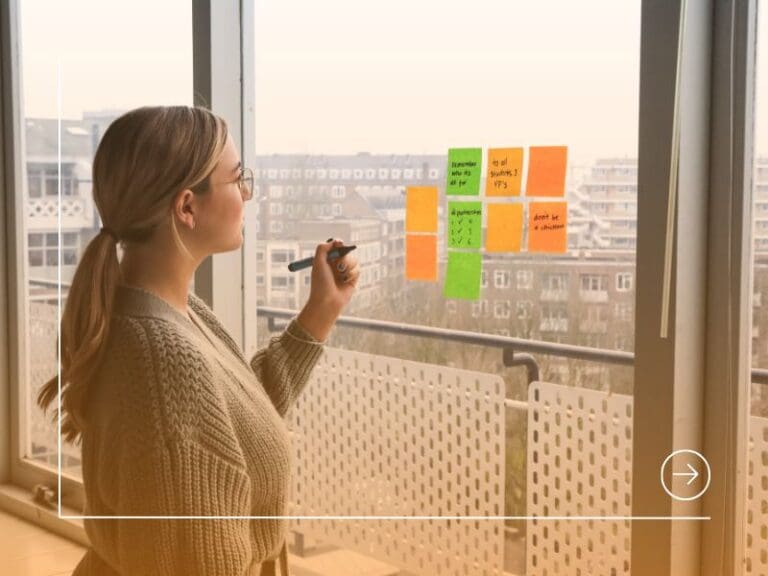Katia Vlachos is a reinvention coach and the author of Uncaged: A Good Girl’s Journey to Reinvention (out now, published by Amplify Publishing).
Katia empowers women to build careers that make them happy and silence any self-doubts that could be holding them back from their goals.

A common pattern I’ve noticed in my coaching practice is that of accomplished, ambitious women who hesitate to ‘take up too much space’.
These are brilliant professionals who have achieved remarkable things in their fields. Yet when they get a seat at the table, they often minimise their presence, their voice, and ultimately their impact.
This has nothing to do with competence. My clients are typically among the most qualified people in their meetings. The pattern has more to do with deep-seated conditioning that makes us believe, among others, that being powerful means being ‘too much’. From early childhood, many of us internalise messages about what makes a woman ‘good’: being agreeable, putting others first, avoiding conflict, not outshining others. As I explore in my book Uncaged, these unconscious ‘inherited’ beliefs and limitations are self-imposed, often invisible ‘cages’ we’ve built around ourselves.
We often receive these messages through our upbringing or, at some point in our lives, something happened to us that made us decide to play small, to dim our light. Even as accomplished professionals, we find ourselves instinctively pulling back right when we should be stepping forward, afraid of being too powerful, too visible, ‘too much’.
This shows up in subtle but costly ways:
- Having brilliant ideas but not sharing them in meetings to avoid ‘dominating the conversation’.
- Giving credit to everyone else while downplaying our contributions, because we’re uncomfortable with ‘self-promotion’.
- Introducing our ideas with “This might be obvious, but…”
- Disagreeing with a point but hesitating to speak up to avoid appearing ‘too assertive’ or, worse, ‘aggressive’.
- Minimising our achievements in performance reviews to maintain likability.
However, when you play small, everyone loses. Beyond the personal toll, this self-diminishment deprives organisations of valuable perspectives.
Here are some practical steps to break free from this ‘cage’:
Recognise the patterns
Track moments when you feel the urge to lay low or downplay your achievements. What triggers it? Perhaps it’s being the only woman in a leadership discussion, presenting to senior executives, or receiving public recognition. Pay attention particularly to physical sensations – tension, quickened breathing – that signal you’re about to make yourself small. Understanding these patterns helps you anticipate and prepare for them.
Reframe what it means to ‘take up space’
Instead of viewing it as being ‘too much’, consider it as adding value. Your expertise, when shared, makes teams stronger and solutions more comprehensive. You’re making a contribution. When you hold back, you’re not just limiting yourself; you’re withholding your valuable perspective from every conversation, decision, and project you are part of.
Pay attention to how you communicate
Begin with written communication, where it might be easier to thoughtfully share your insights. This builds confidence and establishes your expertise. Get into the habit of speaking up early in meetings, because the longer you wait, the harder it becomes to find your voice. Pay attention to the language you use when you communicate: instead of “This might be a silly question,” say “I’d like to understand.” Keep a systematic record of your achievements, noting your contributions each week. Not only does this log build your confidence, it also comes in very handy in performance reviews and career advancement opportunities.
Create support systems
Cultivate relationships with allies who will amplify your voice in meetings – those colleagues who notice when you’re being interrupted or your ideas are being attributed to others. Develop a strong network of women – mentors who’ve navigated similar terrain, understand your challenges, and can offer guidance and support. They can help you avoid common pitfalls and accelerate your growth.
Believe that you don’t have to be likeable to be effective
Many accomplished women feel pressure to be exceptionally agreeable to compensate for their strong presence. Trust that being respected is more valuable than being liked. Your expertise and insights – your contribution – matter more than maintaining harmony at all costs. In fact, thoughtful disagreement may lead to better outcomes than artificial agreement.
Own your achievements
Learn to present your work with clarity and confidence. When discussing projects, don’t hesitate to clearly articulate your leadership role: “I led the strategy for this initiative.” Be specific about the measurable impacts of your work: “My approach increased efficiency by 40%.” When receiving recognition, accept it directly and professionally: “Thank you, I’m proud of solving this challenge.” Despite what many of us are taught, not deflecting a compliment or word of praise doesn’t make you arrogant.
Taking up space is not about overshadowing others, but about showing up fully and owning your impact as a professional. Each time you speak up, share your expertise, or challenge a flawed approach, you’re not just advancing your own career, you’re also modelling behaviour for other women. Breaking free starts with recognising that you’re not ‘too much’ – you’re exactly what’s needed.








